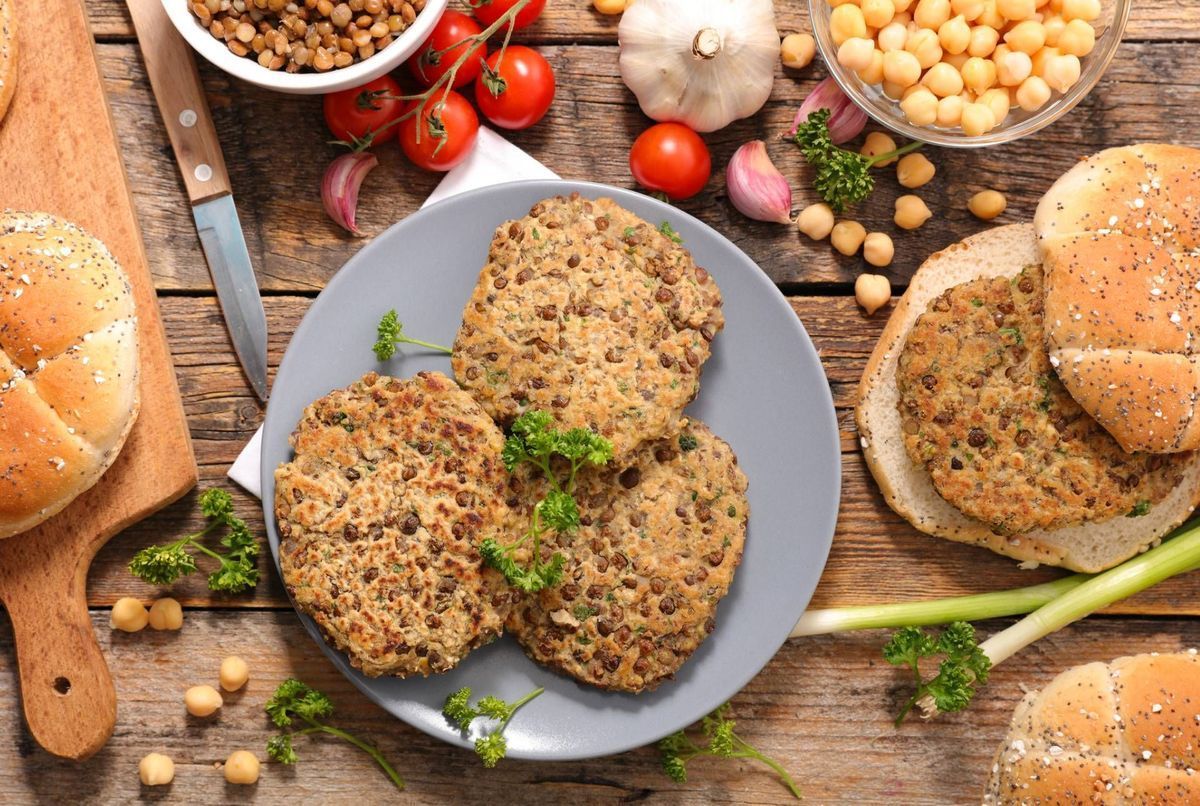If you are considering buying plant-based foods, a trip to the supermarket may leave you perplexed as the choice of plant-based “burgers”, “sausages”, “nuggets” or even “hash” is so wide and diversified. There are in fact many ultra-processed plant-based foods (tofu, vegetable sausages and pancakes, soy-based drinks) offered by the food industry to replace products of animal origin in the face of the increase in the number of vegetarian and vegan consumers. But if the food offer adapted to this type of diet is increasingly present on our shelves, Laura Marchese and Katherine Livingstone, two researchers from Deakin University, warn against the composition of these foods in question. The results of their study, relayed in the journal The Conversion, remind us of the importance of paying close attention to the list of ingredients. And this in particular to identify one of them often present in too large quantities: sodium, a mineral present in foods but also in table salt.
Also discover: Are you eating enough protein? Here are the unmistakable signs, and how to fix them
During a “nutritional audit” of more than 700 plant-based foods sold in (Australian) supermarkets, the scientific team discovered “ that some products are so high in salt or saturated fat that we would have difficulty calling them healthy. » In 2022, she visited two of Melbourne's four major supermarkets to gather information on the available range of plant-based alternatives to meat, before taking photos of the products in question and their nutritional labels. The goal: to analyze in detail the nutritional information appearing on each package, including that of 236 meat substitutes, 169 cans of legumes and 50 cans of white beans cooked in a flavored tomato sauce. The latter having noted the presence of a wide range of plant-based meats for sale, it is therefore not surprising that their findings indicate large variations in their nutritional content. But sodium turned out to be their biggest concern, considering that the WHO recommends consuming less than 2,000 mg of sodium per day for adults.
Plant-based meats are surprisingly salty
The study says sodium content ranged from 1 milligram per 100 grams in products such as tofu, to 2,000 mg per 100 g in products such as plant-based minced products. “ This means we could consume our entire recommended daily sodium intake in just one bowl of plant-based ground meat.. », specify Laura Marchese and Katherine Livingstone. This recalls that a previous audit of 66 plant-based meat products in Australian supermarkets carried out in 2014 had already revealed that sodium varied from 316 mg in legume-based products to 640 mg in products based on tofu, for 100 g. In a 2019 audit of 137 products, the range was up to 1,200 mg per 100 g. “ In other words, our audit results seem to show a consistent trend of plant-based meats becoming saltier. », They add. This discovery echoes the conclusions of a survey by the CLCV association (Consommation Logement Cadre de Vie) in 2020 on 95 plant-based dishes (soy, vegetables, legumes, cereals).
Also discover:Plant-based steaks: good or bad for your health?
The latter had in fact revealed that if “ industrial plant-based steaks are 3 times richer in fiber than beef steak and lower in fat, including saturated fatty acids, the excess consumption of which promotes cardiovascular diseases, they are however richer in sugars and salt . » Added to this is the fact that the vast majority of products (80%) contained at least one additive, the imitation meat category being the worst with on average nearly 2 additives per product, then followed by breaded products (1.7) and vegetable pancakes (1.1). However, if sodium plays a determining role in maintaining the water balance between the inside and outside of cells, excess consumption is recognized as a risk factor for high blood pressure and therefore cardiovascular disease but also osteoporosis by increasing the elimination of calcium by the kidneys. And this is especially true since the average intake of adults worldwide is 4,310 mg of sodium per day (10.78 g of salt per day), more than double the WHO recommendation in this area.
Faced with this observation, the researchers recommend “Choose whole plant foods, like unprocessed legumes, beans or tofu that are packed with vitamins and minerals. They're also high in dietary fiber, which is good for gut health and keeps you fuller for longer. » Another healthier alternative is to favor the preparation of a homemade vegetable pancake so that you can control the choice of ingredients as well as their origin, and often at a lower cost. A welcome recommendation given the fact that, more generally, vegetarian and vegan diets are not always healthier than their meat counterparts due in particular to these plant-based meat substitutes that are too often of poor nutritional quality. This is what emerges from a study of 21,212 people from the NutriNet-Santé cohort carried out by the nutritional epidemiology research team (Eren). As for people who still wish to opt for a processed plant-based food, the two specialists invite them to consider these 3 criteria when making their purchases.
1. Watch sodium
Plant-based meat alternatives can be high in sodium, so look for products with around 150 to 250 mg of sodium per 100 g.
2. Choose canned beans and legumes
Canned chickpeas, lentils, and beans can make healthy, inexpensive additions to many meals. When possible, choose canned varieties without added salt, especially when buying white beans cooked in a flavored tomato sauce.
3. Add herbs and spices to your tofu
Tofu can be a great alternative to meat. Check the label and choose the option with the highest calcium content. We found that flavored tofu had higher salt and sugar content than minimally processed tofu. So it's better to choose an unflavored option and add your own flavors with spices and herbs.
